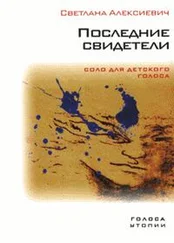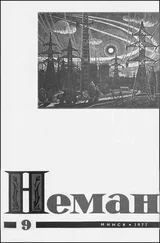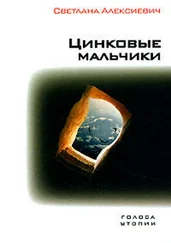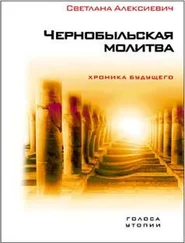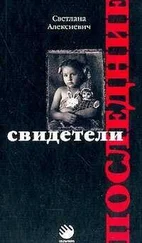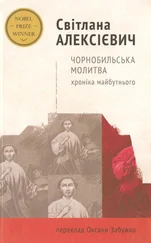Светлана Алексиевич - Chernobyl Prayer - A Chronicle of the Future
Здесь есть возможность читать онлайн «Светлана Алексиевич - Chernobyl Prayer - A Chronicle of the Future» весь текст электронной книги совершенно бесплатно (целиком полную версию без сокращений). В некоторых случаях можно слушать аудио, скачать через торрент в формате fb2 и присутствует краткое содержание. Год выпуска: 2016, ISBN: 2016, Издательство: Penguin Books Ltd, Жанр: Биографии и Мемуары, на английском языке. Описание произведения, (предисловие) а так же отзывы посетителей доступны на портале библиотеки ЛибКат.
- Название:Chernobyl Prayer: A Chronicle of the Future
- Автор:
- Издательство:Penguin Books Ltd
- Жанр:
- Год:2016
- ISBN:9780241270547
- Рейтинг книги:3 / 5. Голосов: 1
-
Избранное:Добавить в избранное
- Отзывы:
-
Ваша оценка:
- 60
- 1
- 2
- 3
- 4
- 5
Chernobyl Prayer: A Chronicle of the Future: краткое содержание, описание и аннотация
Предлагаем к чтению аннотацию, описание, краткое содержание или предисловие (зависит от того, что написал сам автор книги «Chernobyl Prayer: A Chronicle of the Future»). Если вы не нашли необходимую информацию о книге — напишите в комментариях, мы постараемся отыскать её.
Chernobyl Prayer: A Chronicle of the Future — читать онлайн бесплатно полную книгу (весь текст) целиком
Ниже представлен текст книги, разбитый по страницам. Система сохранения места последней прочитанной страницы, позволяет с удобством читать онлайн бесплатно книгу «Chernobyl Prayer: A Chronicle of the Future», без необходимости каждый раз заново искать на чём Вы остановились. Поставьте закладку, и сможете в любой момент перейти на страницу, на которой закончили чтение.
Интервал:
Закладка:
Oh, how happy I was! I wouldn’t change anything in my life, even if someone warned me from above, from the stars, gave me a signal … On the day of the wedding, he couldn’t find his passport. We turned the whole house upside down looking for it. They had to formalize our marriage at the registry office on some form. ‘Oh, daughter, this is a bad omen,’ my mother said, in tears. Later, we found the passport in a pair of his old trousers in the attic. Love! Actually, it was more than love: it was a long process of falling more and more in love. How I danced in the morning in front of the mirror: ‘I’m pretty, I’m young and he loves me!’ Now I’m beginning to forget my face, the face I had when I was with him. I no longer see it in the mirror …
Can we talk about this? Put it into words? Some things are secret … To this day, I don’t really understand what this was. Until our very last month … He would call me in the night. He had desires. He loved more strongly even than before. When I looked at him during the day, I couldn’t believe what was happening during the nights. We really did not want to be parted from each other. I caressed and stroked him. At those times, I remembered our most joyful, happiest moments. I remembered him coming back from Kamchatka with a beard he had grown there, my birthday on that bench in the park. ‘Marry me!’ Should I tell you this? Is it all right? I went to him myself, the way a man goes to a woman. What could I give him other than medicines? What hope? He so much didn’t want to die. He had a belief that my love would save us. It was such a love! Only I never told my mother anything about it. She wouldn’t have understood. She would have condemned me. Cursed me.
This wasn’t the normal cancer everybody’s afraid of, but Chernobyl cancer, which is even more terrible. The doctors explained it to me: if the metastases had affected him from inside his body, he would have died quickly, but they crawled over the surface. Over his body, over his face. He had a kind of black growth over him. Something happened to his chin, his neck disappeared, his tongue flopped out. His blood vessels burst and he began to haemorrhage. ‘Oh dear,’ I would cry. ‘The bleeding again.’ From his neck, his cheeks, his ears. All over the place. I would bring cold water, apply compresses. They didn’t really help. It was horrific. The pillow would get soaked. I would bring a basin from the bathroom. The blood dripped into it, like a cow’s milk hitting the pail. That sound, so peaceful and rural. I still hear it now, in the nights. While he was conscious he would clap his hands – that was a signal we’d agreed. Phone them! Call an ambulance! He didn’t want to die. He was forty-five.
I called the emergency service, but they knew us already and didn’t want to come. ‘We can do nothing to help your husband.’ Well, at least they might give him an injection! Morphine. I would inject him myself. I learned how to do it, but the injection just spread, like a bruise under the skin. It wasn’t taken up. One time, I managed to phone through and the ambulance came. It was a young doctor. He approached him, but then backed away. ‘Tell me,’ he said, ‘I don’t suppose he’s from Chernobyl, is he? Was he one of the people sent there?’ I said, ‘Yes.’ And he literally, I’m not exaggerating, squealed, ‘My dear girl, this just needs to end as quickly as possible! The sooner the better! I’ve seen Chernobyl victims die.’ My man was conscious, he heard him say that. The only good thing was that he didn’t know, he hadn’t guessed, that he was the only member of his team still alive. The last one. Another time, they sent a nurse from the clinic. She stood outside in the hallway and wouldn’t even come into the apartment. ‘Oh, I can’t bear this!’ Well, what about me? I could. I could do everything! What could I think of? How could I help him? He was screaming, he was in pain … crying out all day. I did find a way: I used the syringe to pour a bottle of vodka into him. It put him out like a light. He could forget everything. I didn’t think of that myself, other women told me about it, who had the same problem. His mother would come and say, ‘Why did you let him go to Chernobyl? How could you?’ But at that time, it never came into my head that there was any possibility of not letting him go – or into his, probably, that he could refuse. It was a different time, like wartime. And we were different then ourselves. I did ask him once, ‘Don’t you regret now that you went there?’ He shook his head. ‘No.’ He wrote in the notebook, ‘When I die, sell the car and the spare wheels, and don’t marry Tolik.’ That was his brother. Tolik fancied me.
I know secrets … I was sitting next to him. He was asleep. He still had lovely hair. I took a pair of scissors and quietly cut off a lock. He opened his eyes, saw what I was holding in my hands, and smiled. What I have left now is his watch, his army record card and his Chernobyl medal … ( A long silence .) Oh, how happy I was! In the maternity hospital, I remember during the day I would sit by the window, waiting for him, looking out. I didn’t really understand anything, what was happening or where I was. I just wanted to look at him. I couldn’t see enough of him, as if I sensed this must all come to an end soon. In the morning, I would get him his breakfast and gaze at him as he ate it. Watch him shaving, walking down the street. I’m a good librarian, but I can’t understand how anyone could passionately love their job. I loved only him. Him alone. And I can’t go on without him. I wail at night, scream into the pillow so that the children won’t hear …
I never for a moment imagined we could be parted, that … I knew it, but couldn’t picture it. My mother, his brother … they were preparing me, hinting that the doctors were saying, advising, counselling … In short, there was a special hospital near Minsk where similarly doomed people had been taken in the past … veterans of the war in Afghanistan, without arms or legs, and now Chernobyl victims were being sent there. They urged that he would be better off there, with doctors constantly nearby. I didn’t want it, wanted to hear nothing about it. Then they worked on persuading him, and he started begging me: ‘Send me there. Don’t torture yourself.’ I was trying to get paid carer’s leave, or unpaid leave from work. The law, though, allowed carer’s leave only for looking after a sick child, and unpaid leave from work couldn’t be for more than a month. He filled up our entire notebook with his pleadings, and eventually made me promise I would take him there. His brother gave me a lift. On the outskirts of a village called Grebyonka stood a big wooden house with a well that had collapsed. There was an outside toilet. Pious old women in black … I didn’t even get out of the car. I didn’t go in. That night, I kissed him and said, ‘How could you ask me to agree to that? It’s not going to happen! Never!’ I kissed him all over.
Those horrible, horrible last weeks … Taking half an hour to piss into a half-litre jar. He wouldn’t look up, embarrassed. ‘How can you think like that?’ I kissed him. That last day, there was an amazing moment. He opened his eyes, sat up, smiled and said my name, ‘Valyushka!’ I was struck dumb with happiness, at hearing his voice again …
They telephoned from his workplace: ‘We want to bring him a certificate of honour.’ I told him, ‘Your lads want to come and give you a diploma.’ He shook his head. No, and no! But they came anyway … brought some money and the certificate, in a red folder with a picture of Lenin. I took it, and thought, ‘What is he dying for? In the newspapers, they’re writing it’s not just Chernobyl but Communism that has blown up. The Soviet way of life is finished, but that profile on the red folder is still the same.’ The lads wanted to say some words of appreciation to him, but he hid himself under the blanket, with only his hair showing. They stood over him for a time and then left. He didn’t want anyone to see him now. It was only me he would allow to see him. But we die alone. I called him, but he no longer opened his eyes. He was only just breathing …
Читать дальшеИнтервал:
Закладка:
Похожие книги на «Chernobyl Prayer: A Chronicle of the Future»
Представляем Вашему вниманию похожие книги на «Chernobyl Prayer: A Chronicle of the Future» списком для выбора. Мы отобрали схожую по названию и смыслу литературу в надежде предоставить читателям больше вариантов отыскать новые, интересные, ещё непрочитанные произведения.
Обсуждение, отзывы о книге «Chernobyl Prayer: A Chronicle of the Future» и просто собственные мнения читателей. Оставьте ваши комментарии, напишите, что Вы думаете о произведении, его смысле или главных героях. Укажите что конкретно понравилось, а что нет, и почему Вы так считаете.

